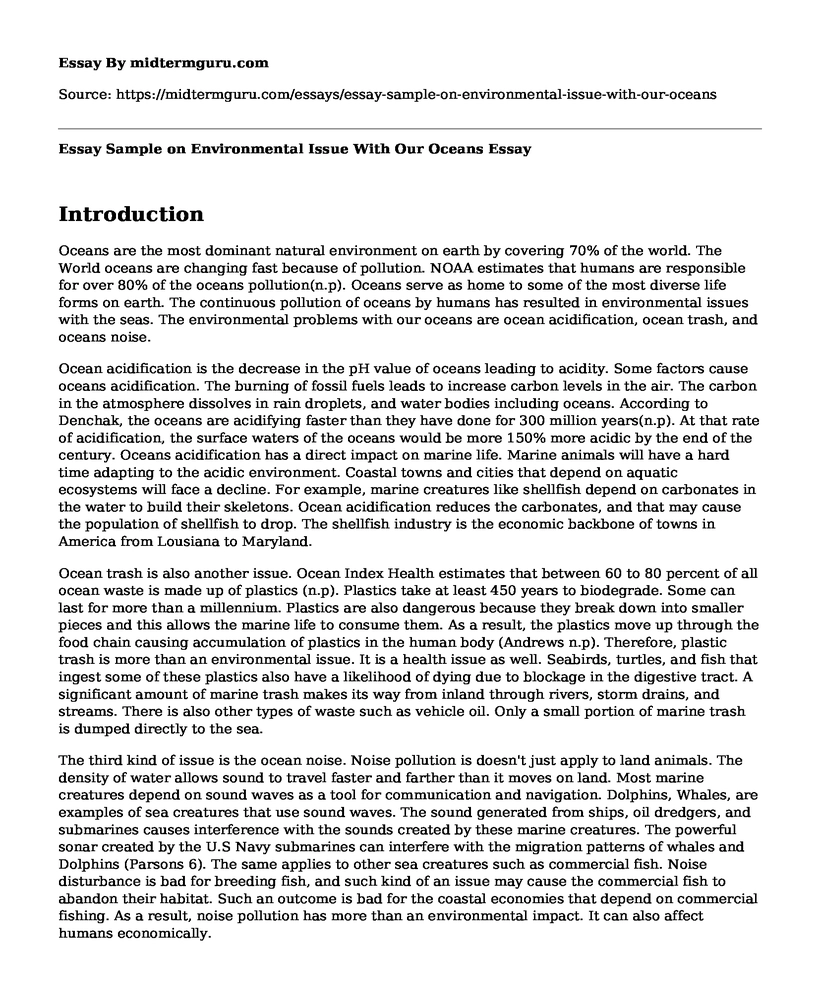Introduction
Oceans are the most dominant natural environment on earth by covering 70% of the world. The World oceans are changing fast because of pollution. NOAA estimates that humans are responsible for over 80% of the oceans pollution(n.p). Oceans serve as home to some of the most diverse life forms on earth. The continuous pollution of oceans by humans has resulted in environmental issues with the seas. The environmental problems with our oceans are ocean acidification, ocean trash, and oceans noise.
Ocean acidification is the decrease in the pH value of oceans leading to acidity. Some factors cause oceans acidification. The burning of fossil fuels leads to increase carbon levels in the air. The carbon in the atmosphere dissolves in rain droplets, and water bodies including oceans. According to Denchak, the oceans are acidifying faster than they have done for 300 million years(n.p). At that rate of acidification, the surface waters of the oceans would be more 150% more acidic by the end of the century. Oceans acidification has a direct impact on marine life. Marine animals will have a hard time adapting to the acidic environment. Coastal towns and cities that depend on aquatic ecosystems will face a decline. For example, marine creatures like shellfish depend on carbonates in the water to build their skeletons. Ocean acidification reduces the carbonates, and that may cause the population of shellfish to drop. The shellfish industry is the economic backbone of towns in America from Lousiana to Maryland.
Ocean trash is also another issue. Ocean Index Health estimates that between 60 to 80 percent of all ocean waste is made up of plastics (n.p). Plastics take at least 450 years to biodegrade. Some can last for more than a millennium. Plastics are also dangerous because they break down into smaller pieces and this allows the marine life to consume them. As a result, the plastics move up through the food chain causing accumulation of plastics in the human body (Andrews n.p). Therefore, plastic trash is more than an environmental issue. It is a health issue as well. Seabirds, turtles, and fish that ingest some of these plastics also have a likelihood of dying due to blockage in the digestive tract. A significant amount of marine trash makes its way from inland through rivers, storm drains, and streams. There is also other types of waste such as vehicle oil. Only a small portion of marine trash is dumped directly to the sea.
The third kind of issue is the ocean noise. Noise pollution is doesn't just apply to land animals. The density of water allows sound to travel faster and farther than it moves on land. Most marine creatures depend on sound waves as a tool for communication and navigation. Dolphins, Whales, are examples of sea creatures that use sound waves. The sound generated from ships, oil dredgers, and submarines causes interference with the sounds created by these marine creatures. The powerful sonar created by the U.S Navy submarines can interfere with the migration patterns of whales and Dolphins (Parsons 6). The same applies to other sea creatures such as commercial fish. Noise disturbance is bad for breeding fish, and such kind of an issue may cause the commercial fish to abandon their habitat. Such an outcome is bad for the coastal economies that depend on commercial fishing. As a result, noise pollution has more than an environmental impact. It can also affect humans economically.
Works Cited
Andrews, Gianna. Plastics in the Ocean Affecting Human Health. Undergraduate. Montana State University. Bozeman: Teach the Earth, 2012. Website. 9 November 2018. <https://serc.carleton.edu/NAGTWorkshops/health/case_studies/plastics.html>.
Denchak, Melissa. Ocean Pollution: The Dirty Facts. 22 January 2018. National Resource Defense Council. Website. 9th November 2018. <https://www.nrdc.org/stories/ocean-pollution-dirty-facts>.
NOAA. What is the biggest source of pollution in the ocean? 25 May 2018. National Oceans and Atmospheric Administration. Website. 9 November 2018. <https://oceanservice.noaa.gov/facts/pollution.html>.
Ocean Index Health. Trash Pollution. 7 November 2014. Website. 9th November 2018. <http://www.oceanhealthindex.org/methodology/components/trash-pollution>.
Parsons, E. C. M. "Impacts of Navy Sonar on Whales and Dolphins: Now beyond a Smoking Gun?" Frontiers in Marine Science 4.295 (2017): 11. PDF. 9 November 2018. <https://www.frontiersin.org/articles/10.3389/fmars.2017.00295/full>.
Cite this page
Essay Sample on Environmental Issue With Our Oceans. (2022, Sep 28). Retrieved from https://midtermguru.com/essays/essay-sample-on-environmental-issue-with-our-oceans
If you are the original author of this essay and no longer wish to have it published on the midtermguru.com website, please click below to request its removal:
- Essay on Factors That Resulted to Climatic Changes in North Seattle
- Paper Example on Practical Solutions to Global Warming
- Environmental Pollution and Degradation - Essay Sample
- The Perils of Plastics: How Our Everyday Habits Impact Our World - Research Paper
- Haiti Earthquake 2010 - Essay Sample
- Toyota's Environmental Pollution: Ethical Actions & Behaviour - Research Paper
- Animal Testing Should Be Banned - Argumentative Essay







